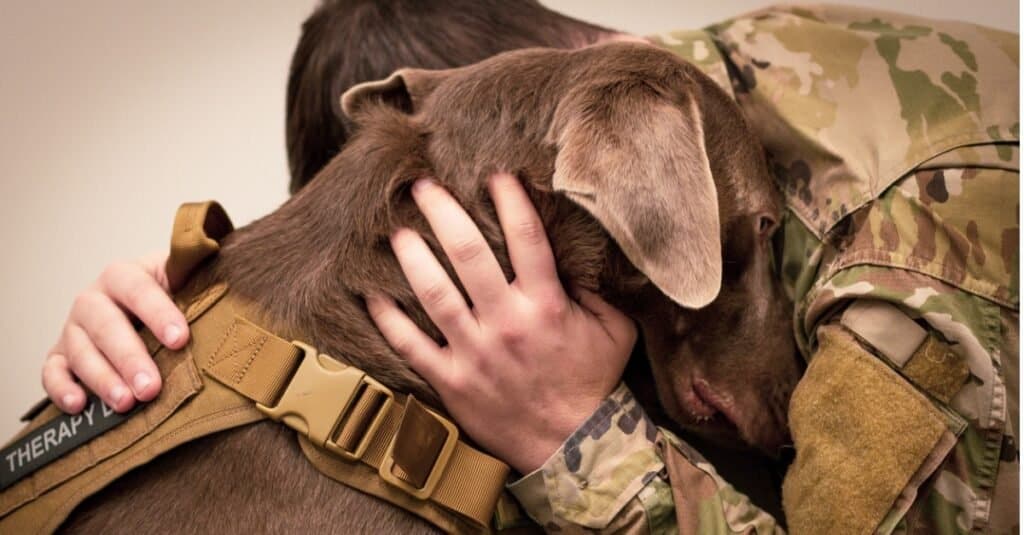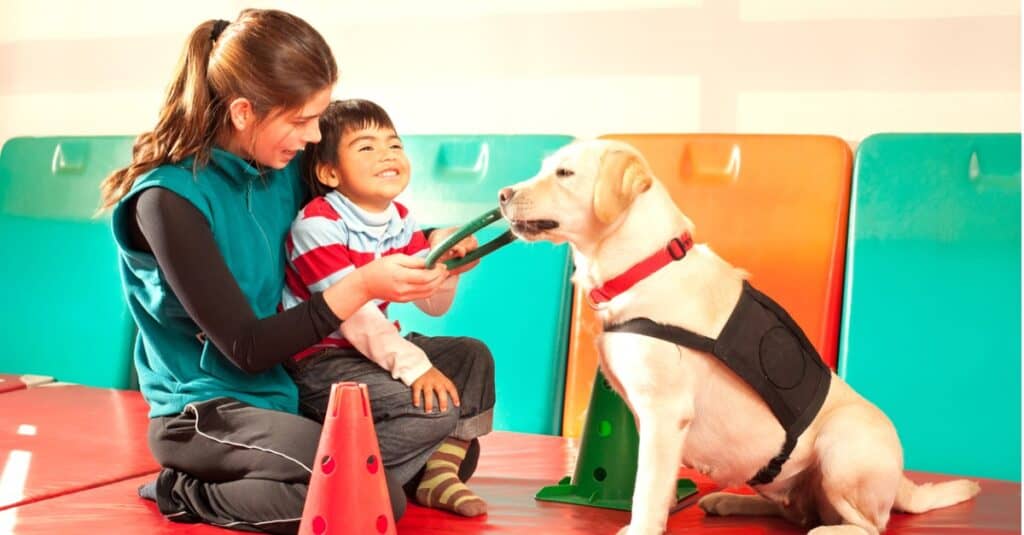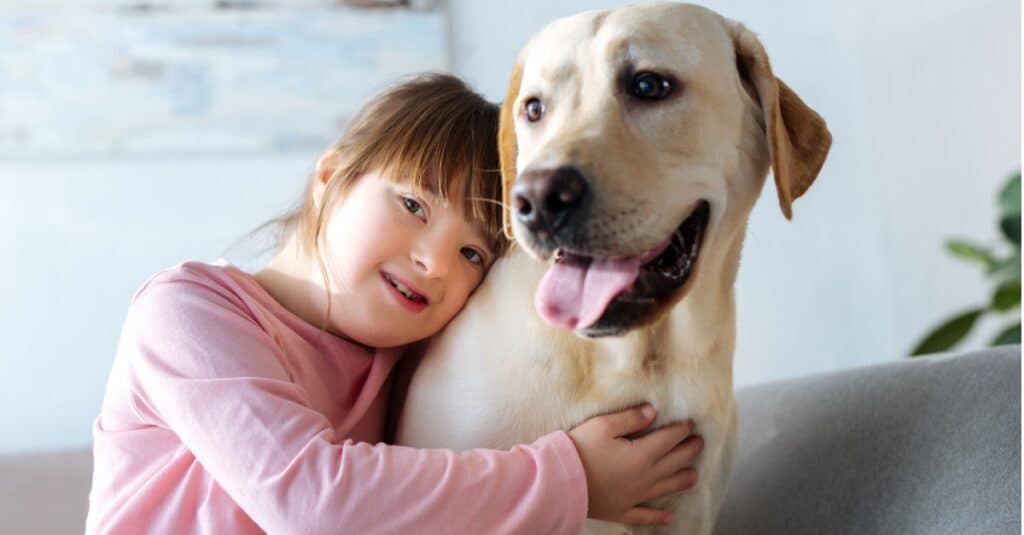An emotional support animal is an animal that provides comfort and support to help people deal with life challenges. It is not a working or service dog but a pet, yet it gets to live with the owner even where pets aren’t allowed. Unlike service dogs, ESA dogs cannot accompany their owner into shopping malls and restaurants. They also require no training or registration and include several small breeds. Dogs make the best emotional support animals due to their loyalty, affection, trainability, confidence, gentleness, and calmness, and certain breeds are better emotional support dogs than others. Here’s the scoop on eight different types of emotional support dogs that exist.
1. Post-Traumatic Stress Disorder (PTSD)

©iStock.com/Jason Hohnberger
While according to the ADA (Americans with Disabilities Act), emotional support animals (ESA) are not considered service animals as they are not trained to perform specific tasks for those with disabilities. However, state and local governments may make accommodations for persons with ESAs to bring their animals into public places. PTSD and C-PTSD (Chronic Post-Traumatic Stress Disorder) take a toll on one’s relationships, emotions, energy, and quality of life. PTSD or C-PTSD can be a temporary or permanent condition with nightmares, flashbacks, intense anxiety, and other symptoms. An ESA dog can provide the companionship and unconditional love someone with PTSD or C-PTSD needs in their daily life to cope positively, while the physical contact and care of the dog will help ground them.
Best Breeds for PTSD
Some of the small breeds can be more energetic than medium and large breeds.
- Golden Retriever
- Labrador Retriever
- German Shepherd
- Doberman Pinscher
- Poodle
- Pug
- Cavalier King Charles Spaniel
- Llasa Apso
2. Anxiety
People with anxiety disorders experience intense anxiety, worry, or panic that may or may not be caused by a health issue. An ESA dog for anxiety can help calm down its owner and provide reassurance, silliness, adventure, and entertainment to make them smile. By being the companion the owner will be sure to pay attention to, the ESA dog takes their mind off excessive worrying.
Best Breeds for Anxiety
It turns out that for people with anxiety disorders, bigger are generally better because large dogs provide a unique sense of safety. Hence, the best breeds are similar to those for PTSD, but with the addition of the following:
- Great Pyrenees
- St. Bernard
- Standard Poodle
- Boxer
- Samoyed
- Siberian Husky
- Maltese,
- Havanese Dog
- Bichon Frise
- Yorkshire Terrier
3. ADHD (Attention-Deficit Hyperactivity Disorder)

©iStock.com/Photoboyko
People with ADD or ADHD find it difficult to maintain a long attention span and have problems sitting still and having self-control, such as the consistency to get things done promptly They are easily distracted and may have trouble socializing. People with ADD or ADHD tend to be diagnosed as children, so ESA dogs for ADHD are especially helpful for their development. For adults, ESA dogs give a healthy distraction and encourage them to be consistent.
Best Breeds for ADHD
These dogs are not hypoallergenic and tend to have long fur, the brushing of which provides a comforting, healthy daily routine.
- Jack Russell Terrier
- Bernese Mountain Dog
- Golden Retriever
- Labrador Retriever
- German Shepherd
- Great Pyrenees
- Cavalier King Charles Spaniel
- Rough Collie
- Samoyed
- some mixed breeds
4. Depression
For people who suffer from chronic depression, the condition is like a huge black hole that threatens to swallow them up. Sometimes, it’s like a pit they can’t climb out of. Depression can come in the guise of anger, anxiety, stress, fatigue, or feeling sick. ESA dogs provide the unique unconditional love and companionship that another human cannot, and breeds for depression can be cheerful enough to alleviate feelings of loneliness and help them see beyond the dark clouds.
Best Breeds for Depression
5. Autism

©iStock.com/tifonimages
Autism is a spectrum, which can range from high-functioning to severe. Individuals with autism may have difficulty dealing with emotions or socializing. ESA dogs can provide the emotional support and deep connection they need to live a more balanced, fulfilling life.
Best Breeds for Autism
- Golden Retriever
- Labrador Retriever,
- German Shepherd
- Bernese Mountain Dog
- St. Bernard
- Samoyed
- Bichon Frise
- Beagle
- Miniature Schnauzer
- Pug
- Corgi
6. Learning Disability
A learning disability is a disability in a subject such as reading or math. It is a struggle when dealing with everyday tasks, leading to stress and upset. ESA dogs for learning disabilities can encourage their owners to persevere.
Best Breeds for Learning Disability
- Golden Retriever
- Labrador Retriever
- Cavalier King Charles Spaniel
- Great Pyrenees
- Standard Poodle
- Great Dane
- Corgi
- Maltese
- Havanese Dog
- Yorkshire Terrier
- some mixed breeds
7. Intellectual Disability

Disabilities come in all shapes and sizes. An ESA
©iStock.com/LightFieldStudios
An intellectual disability is when someone has a below-average IQ and has a lack of daily living skills. It can affect their reasoning, learning, decision-making, and problem-solving. Like a learning disability, it can lead to stress and upset, and ESA dogs can help orient them.
Best Breeds for Intellectual Disability
- Golden Retriever
- Labrador Retriever
- Cavalier King Charles Spaniel
- Great Pyrenees
- Standard Poodle
- Great Dane
- Corgi
- Maltese
- Havanese Dog
- Yorkshire Terrier
- some mixed breeds
8. Motor Skills Disorder
Motor Skills Disorder results in poor physical coordination as the brain cannot properly transmit messages to the body. It leads to difficulty with feeding themselves, walking, and running. An ESA dog for Motor Skills Disorder is friendly, nurturing, easygoing, and patient and is eager to accompany its owner on a walk, run, or while eating a meal.
Best Breeds for Motor Skills Disorder
- Golden Retriever
- Labrador Retriever
- some mixed breeds
Hypoallergenic ESA Dogs
The Bichon Frise, Schnauzer, Maltese, and Poodle are all hypoallergenic. They shed little to none at all, so they don’t cause or exacerbate allergies for people that are sensitive to pet dander. They’re good choices for people needing ESA dogs but don’t have much energy or ability for daily grooming.
ESA Dogs vs. Therapy Dogs vs. Service Dogs
With the different types of emotional support dogs out there, it’s easy to think that they, therapy dogs, and service dogs are the same. They are not. ESA dogs are pets, don’t need training or registration, and include more small breeds. Therapy dogs and service dogs are types of working dogs that need training and registration, but therapy dogs are considered to be pets in places other than where regular dogs and therapy dogs are allowed. Some service dogs are psychiatric dogs for people with mental health issues, and all service dogs work with individual handlers who have some type of disability. Therapy dogs work with a variety of people in public places.
Emotional support dogs are important as pets, especially for people with a disability or disorder. The different types of emotional support dogs show that certain breeds are better for certain disabilities or disorders. ESA dogs need no training and registration because they are not service, therapy, or working dogs, instead of relying on their natural instincts and personality traits to comfort their owners.
Up Next…
Keep reading these posts for more incredible information about key animal facts.
- Types of Police Dogs: They’re right there making society a safer place with skills only a canine can possess. Read about them and what they do and the special qualities that make them so effective.
- Types of Husky Dogs: Wolflike, energetic, and talkative, huskies have become one of the most popular breeds. Read all about what makes them so special.
- Types of Retriever Dogs: They were bred to catch game, hence their name. Find out about the different breeds of this category of canine which is hardy, yet friendly and intelligent.
The photo featured at the top of this post is © Africa Studio/Shutterstock.com
Ready to discover the top 10 cutest dog breeds in the entire world?
How about the fastest dogs, the largest dogs and those that are -- quite frankly -- just the kindest dogs on the planet? Each day, AZ Animals sends out lists just like this to our thousands of email subscribers. And the best part? It's FREE. Join today by entering your email below.
Thank you for reading! Have some feedback for us? Contact the AZ Animals editorial team.







